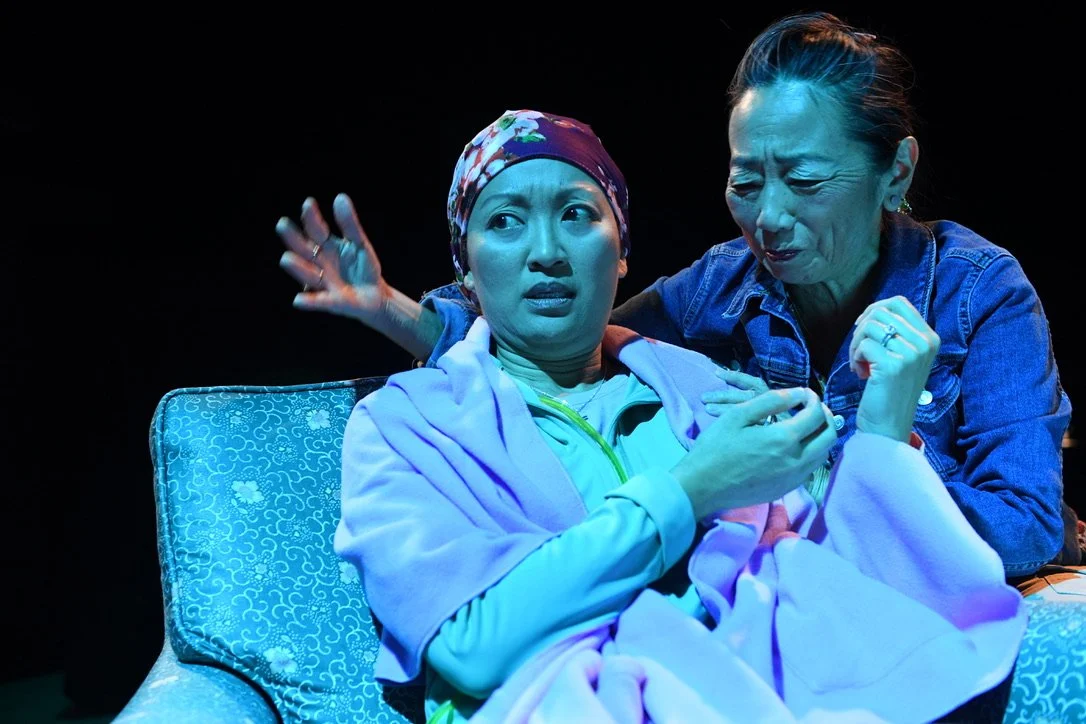Bald Sisters Emphasizes a Move Towards Representation in Theater
Nicole Tung, in character as Him, held burning sticks of incense pressed between both hands as the lights went up on the intricate set of “Bald Sisters.”
The play, written by Vichet Chum, made its west coast debut at the San Jose Stage on Sept. 13th, with direction from Jeffrey Lo. The production previously ran at the Steppenwolf Theatre Company in Chicago with a different cast.
“Bald Sisters” follows two sisters whose lives are upended and dynamic is tested from the death of their mother, played by Keiko Carreiro. Tung, a Santa Clara alum, stars as the settled-down older sister, undergoing chemotherapy and a rocky relationship with her husband, played by Will Sprinnghorn Jr., who is a pastor. Sophea, played by Rinabeth Apostol, is navigating her tumultuous, youthful and nomadic life, which includes a chance encounter with Seth, played by Zaya Kolia, a local student who also mows Him’s lawn. The two sisters are tasked with organizing their late mother’s wishes and funeral, all while reckoning with their own personal relationship, which has been strained for years.
The story is deeply rooted in identity. Both women are Cambodian-American, Him having immigrated with their parents as a child, and Sophea born in the United States soon after. These two identities are central to the individual and collective explorations that each sister embarks on throughout the play.
Recently in her career, Tung has been able to work with up-and-coming playwrights in shows similarly rooted in identity, like David Henry Hwang’s “Chinglish” and Dustin H. Chinn’s “Colonialism Is Terrible, But Phở Is Delicious.” These plays make space on both the page and stage for historically underrepresented groups.
“I think because of there being more of an awareness to tell different stories, there's also more of a push to find playwrights from vastly different backgrounds than what traditionally was designed that way,” Tung notes. “For a lot of my friends within the BIPoC community, there's this huge insurgence of playwrights who have these new stories that we all get to tell rather than telling what's traditionally, let's say, a white story.”
Tung got her start on stage at Santa Clara as an undergraduate, taking part in dance performances, including the annual Images show, and appearing in a production of “My Fair Lady” in her senior year. After graduation, she went on to perform in a variety of shows for American Musical Theater in San Jose. After taking a hiatus to raise her daughter and having a production halted by the onset of the pandemic, she returned to the stage in 2022 for “Pajama Game” with theater company 42nd Street Moon.
“It's an older show,” Tung said. “And there are some problems with the original script. Fortunately, 42nd Street was allowed to take the script and update it a little bit. So we did a different version than the traditional version.”
But the theater world looked much different in Tung’s time at Santa Clara. As she was getting her start in the acting world, plays like “Bald Sisters” were not given the same investment as other shows.
“I think when I graduated from Santa Clara, [Bald Sisters] would not have existed,” she said. “Or if it did, it wouldn't have gotten any traction anywhere. Just because at the time, nobody was looking for it.”
As an audience member, it was immediately clear that “Bald Sisters” had an immense amount of work put into the details. From the effectively and beautifully arranged set (that required little to no shifting and accommodated every scene in the show), to the individual choreographic and dialectal specifics that Tung paid close attention to. Patrick Chew, who worked as a Dialect, Language, and Cultural Consultant, helped ensure that the particulars of Cambodian culture were accurate.
“From day one, he came in, sat down with us at our table read, he went through the language, so we made sure we were pronouncing everything properly, that Ma’s accent is accurate,” Tung says of Chew. “Like for my first moment, when I'm praying, whether I'm on my heels versus sitting on my toes, where my fingers are placed with the incense, all of those things, he helped make sure that we're doing everything properly.”
Tung has noticed inclusivity in theater, cultural sensitivity and the importance of identity being prevalent among the attitudes of young actors, especially new graduates.
“I do think meeting people from everywhere in college just helps to broaden your horizons, understand people more and understand that desire for inclusivity and community more,” she said. “I've worked with a handful of people who have come right out of college, and from what I gather, I feel like the younger generation is a lot more aware of the issues than the older generations are.”
Update Thursday, Oct. 5: The show is running currently at the San Jose Stage until Sunday, October 8th. Tickets can be purchased at thestage.org.
